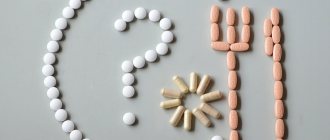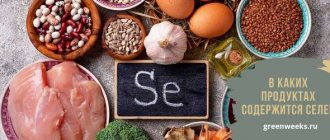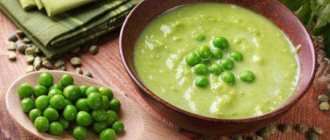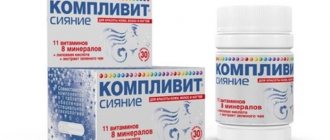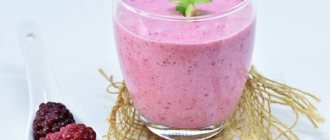Vegans, like vegetarians, need a specialized selection of vitamins due to the fact that some substances can only be obtained from animal foods. In this article, we'll break down the key vitamins and choose the best ones based on science.
Almost all vegans love animals, but are tired of answering the same questions about their diet. For example, I am often asked where do I get protein if I don’t eat meat? This question can only cause confusion, because vegans get protein from food, just like everyone else.
For comparison, one 100-calorie serving of broccoli contains 8.34 grams of protein versus 7.94 grams of protein in a similar serving of steak. (, )
There is a similar myth about calcium deficiency in vegans, which is associated with avoiding dairy products. But look at the elephants, rhinoceroses and gorillas. They're fine, even though they don't spoil themselves with cheese, right?
All this leads to the conclusion that vegetable-eating vegans do not really need additional vitamins and minerals.
However, multivitamins can be beneficial for them as well, since they help maintain the required level of water-soluble vitamins (they are quickly eliminated from the body), contain additional phytonutrients, and solve a possible problem with vitamin B12.
The essence of the problem
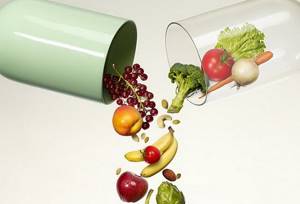
Why have vitamins for vegetarians become such a talk of the town? The fact is that here, indeed, many questions arise to which there are no clear answers. So you have to look for a middle ground on your own.
- Is vitamin deficiency an inevitable companion to vegetarianism?
Fact: animal and plant foods actually differ in their set of vitamins.
On the one hand, it is believed that fruits and vegetables cannot fully replace meat and fish, and as a result, a lack of certain nutrients in the body may occur.
On the other hand, meat and fish contain very few vitamins, and almost all of them are replenished with plant foods. The exception is B12. Its deficiency is diagnosed mainly in vegans. Lacto-ovo vegetarians do not face this problem, since milk and eggs allow them to reduce the risk of vitamin deficiency to a minimum.
Conclusion: no, vitamin deficiency is not inevitable for vegetarians. With a well-designed diet, it can be avoided. The solution for vegans is to use ecological dietary supplements in the form of mineral and vitamin complexes.
- Do you need additional vitamin complexes?
Fact: long-term vegetarianism at certain points in life (stressful situation, pregnancy, long-term illness) can lead to a lack of vitamins. No one is immune from this.
On the one hand, it is believed that in such situations it will be enough for vegetarians to indulge in fruits and vegetables enriched with the vitamin whose deficiency was discovered.
On the other hand, the absorption of vitamins from food is often difficult due to some factors. So this does not always help cope with vitamin deficiency. Therefore, most doctors strongly recommend taking additional vitamin complexes.
Conclusion: you need to listen to doctors - after all, in critical situations, when the body needs support, and also twice a year, when the risk of vitamin deficiency increases (this is late autumn and mid-spring), you can drink an additional complex. It definitely won’t be superfluous, and it won’t do any harm.
- Vegetarians should not take pharmaceutical vitamin complexes.
Fact: modern pharmacology produces too many drugs that contain ingredients of animal origin.
On the one hand, it is believed that pharmaceutical products contain enough substances of animal origin. This means that vegetarians should not drink them.
On the other hand, it is impossible to say unequivocally which vitamins this or that manufacturer used in its complex - plant or animal origin.
Conclusion: if you have such doubts, it is better to purchase drugs from special eco-friendly resources or in vegetarian food stores. You can definitely buy 100% herbal products there.
Precautionary measures
Like any other drug, supplements designed to compensate for the deficiency of vitamins and microelements in a vegetarian diet can cause allergic reactions. If the first signs of intolerance to the drug appear (rash, burning and itching, as well as manifestations from the upper respiratory tract), you should stop taking it and see a doctor.
The recommended dosage should be followed. By increasing the dose of the vitamin, there is a risk of an allergic reaction. For children, the dosage and duration of the course are selected individually.
What vitamins are missing?
Even those who eat meat and fish often suffer from vitamin deficiency. So there is nothing supernatural in the fact that vegetarians sometimes lack certain vitamins. The reasons may be different: from an incorrectly formulated diet to a protracted illness.
The most common deficiency is:
- A (retinol) - found in fish oil, liver (especially beef), caviar, milk, butter, sour cream, cottage cheese, cheese, egg yolk;
- D (calciferol) - its sources are fish oil, fatty fish (salmon, cod), caviar, butter, cheese, egg yolk;
- B12 (cyanocobalamin) - it can be found in beef, chicken and pork liver, lamb, chicken heart, seafood (octopus, mussels, shrimp), fish (herring, mackerel, carp), cheese, egg yolk, yogurt, sour cream.
Looking at the main sources of these vitamins, the question of why vegetarians are often deficient in them disappears. And if retinol with calciferol can still be found in plant foods, then with cyanocobalamin this problem is much more acute.
Note. Here we are not considering a lack of protein and minerals (calcium, iron, etc.), since we are talking exclusively about vitamins.
Omega-3 and Omega-6 fatty acids
Fatty acids perform important tasks in the body - they prevent the development of arthritis, eczema, oncology, stroke and other cardiovascular diseases. Omega-3 and Omega-6 deficiency is evidenced by frequent depression, fatigue, low concentration, joint pain, skin and vision problems.
The richest source of acids is fish, which vegans do not eat. Special supplements and certain foods (avocados, walnuts, sesame oil, flaxseed) will help fill the deficiency.
Why is it dangerous?
Unfortunately, not all vegetarians take seriously the possible lack of the above vitamins in their bodies. At first glance, there really are only three of them, some can be replenished with vegetarian food - what to worry about? In fact, a long-term and constant deficiency of each of them can lead to difficult-to-treat and sometimes irreversible health consequences. Judge for yourself.
Retinol hypovitaminosis:
- hemeralopia - impaired twilight vision and adaptation in the dark;
- hyperkeratosis - intense desquamation of the skin and mucous membranes;
- slow bone growth (especially dangerous for children);
- keratomalacia - purulent softening of the cornea;
- xerophthalmia - dry cornea;
- the risk of inflammatory processes increases - dermatitis, rhinitis, pharyngitis, bronchitis, etc.
Calciferol hypovitaminosis:
- insomnia;
- hypertension;
- scalp hypothyroidism;
- slow growth in children;
- caries, deformation of teeth and bones;
- migraine;
- muscle cramps;
- problems with the heart and blood vessels;
- sudden weight loss;
- weakness, deterioration of health, lethargy - all this often develops into a depressive state;
- joint pain.
Cyanocobalamin hypovitaminosis:
- anemia;
- lethargy, weakness, excessive drowsiness;
- hematological changes: thrombocytopenia (decreased platelets), decreased iron levels;
- genetic pathologies that provoke the development of oncology and mutations;
- visual impairment;
- neurological disorders: tingling and numbness in the joints, deterioration of memory and concentration, stiffness in the limbs, sleep disturbances, decreased pain threshold;
- mental disorders: schizophrenia, irritability, nervousness, depression, dementia, psychosis, hallucinations;
- decreased appetite and, as a result, weight loss;
- in women - disruption of the menstrual cycle.
Since the risk of vitamin deficiency is the highest with vegetarianism, you need to be extremely careful about the daily intake of each of these vitamins. It will be determined by special tables.
Retinol

Calciferol

Cyanocobalamin
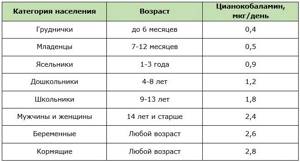
Contraindications and side effects
Mono-supplements in most cases do not cause side effects and are absorbed well if there is no individual intolerance. Complexes of components in some cases can contribute to the development of allergies.
Side effects are rare for this group of drugs. They usually occur when the recommended method of administration and dosage is violated. Expressed in the following symptoms:
- dizziness, nausea;
- general weakness;
- dyspepsia (abnormal stool, loss of appetite, abdominal pain, less often - vomiting);
- anxiety and sleep disturbances, palpitations;
- redness of the skin, rash, itching.
If one of the signs of side effects is detected, you should stop taking the vitamin product.
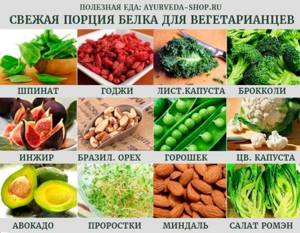
Sources of protein for a vegetarian diet
Natural sources
How to ensure that retinol, cyanocobalamin and calciferol are present in the diet in sufficient quantities? The first way is to increase your consumption of foods rich in them. Based on this, vegetarians need the following plant sources of vitamins in their menu.
A:
- legumes: soybeans, peas;
- kelp;
- vegetables (mostly green and yellow): carrots, sweet peppers, pumpkin, spinach, green onions, broccoli, parsley;
- herbs: fennel, plantain, oats, alfalfa, borage, burdock root, cayenne pepper, hops, horsetail, lemongrass, nettle, mullein, parsley, peppermint, sage, sorrel, bearberry, clover, violet and raspberry leaves;
- fruits: apples, peaches, apricots, grapes, watermelon, melon;
- berries: rose hips, cherries, sea buckthorn.
D:
- seaweed;
- forest (but not industrial, grown under artificial light) mushrooms (especially chanterelles);
- yeast.
AT 12:
- For lacto-ovo vegetarians, almost all dairy products and eggs;
- for vegans, alas, plant foods are not a source of cyanocobalamin.
Vegetarians need all these products for regular consumption. This does not mean that you need to try to eat everything on the list in 1 day. Everything should be moderate and competent. Let's say you discover you have a retinol deficiency. Today you lean on salads and soup made from vegetables that are rich in them; tomorrow - cook legumes; the day after tomorrow - give preference to fruits; and as drinks you drink daily infusions of herbs, in which its content is high.
Iodine
Iodine is essential for thyroid health. It is present in small quantities in plants depending on the soil in which they grew. Seaweed also contains iodine.
Vegans who eat edible seaweed several times a week, such as in sushi, should get adequate amounts of iodine.
Iodized salt is also common in many regions, so people can get enough iodine from the salt found in homemade dishes.
People who are concerned they are not getting enough iodine should talk to their doctor about taking a supplement.
Drugs
It is not always possible to compensate for the deficiency of nutrients from plant foods. In such situations, there is nothing left to do but turn to various complexes and supplements for help. Any pharmacy will offer good vitamins - balanced in composition and certified. But, as we have already said, there is always a risk of purchasing a drug that contains components of animal origin. Therefore, you need to first study additional information about each product.
To avoid such doubts, purchase vitamin complexes in vegetarian food stores or on specialized online sites offering 100% herbal preparations.
Individual vitamins
If you know exactly what vitamin your body is lacking, you can purchase its preparations at the pharmacy:
- Retinol acetate (tablets, capsules, ampoules for injection), retinol palmitate (oil solution).
- D3 in tablets and capsules, colecalceferol (oil solution) are very good remedies for joints and ligaments, so these drugs are recommended primarily for those vegetarians who are over 40, or athletes.
- Cyanocobalamin or methylcobalamin (tablets, capsules, spray, injection solutions).
If you want to be 100% sure that the vitamins were made from plant materials, purchase those that say so: vegan tablets, for vegetarians, etc. These are:
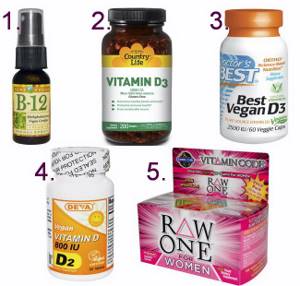
- Spray with B-12 from Pure Vegan (USA).
- D in lozenges with different flavors from Country Life (USA).
- Best Vegan D3 from plant sources from Doctor's Best (USA).
- D2 vegan from Deva (Australia).
- Organic plant retinol from Garden of Life (USA).
These are plant-based vitamins that are made specifically for vegetarians.
Multivitamin complexes
You can choose a whole complex of vitamins - experts recommend drinking such products twice a year, in spring and autumn. This is an excellent prevention against vitamin deficiency. The range is quite wide, and you can choose from the following brands:
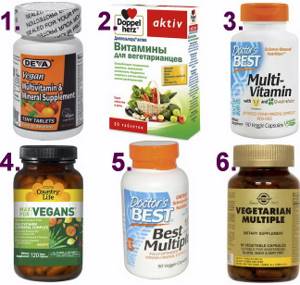
- Vegan Multivitamins&Mineral Supplement from Deva (Australia).
- Active for vegetarians from Doppelherz / Doppelherz (Germany).
- Vegan - complex from Doctor's Best (USA).
- Support for vegetarians - multivitamins and minerals from Country Life (USA).
- Best Multiple is an optimized complex of multivitamins and minerals from Doctor's Best (USA).
- Vegan Multiple - vegetarian multivitamins from Solgar (USA).
Since the best vitamins for vegetarians are produced mainly by brands from America, they can be ordered online. I would especially like to highlight Iherb, an American online store known throughout the world. Its advantage is that it promotes exclusively environmentally friendly products. Most of the above-mentioned complexes can be found there.
How to take vitamins for vegetarians
Vitamin-mineral complexes and mono-additives for vegetarians are taken according to the instructions for the medications. The recommended dose should be taken during meals or immediately after meals. This rule applies to all dietary supplements.
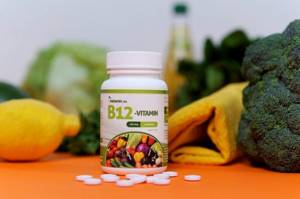
Vitamin-mineral products are not a medicinal form; they are biologically active supplements that should be taken with food
Before taking a course of the chosen remedy, you should consult a specialist.
Important! If you have a history of diseases of the endocrine system, consultation with a doctor should be mandatory!
The course of taking vitamins is usually 1 month, after which a break of at least 2 weeks is necessary. The dosage and duration of use may depend on the individual characteristics of the person.
Individual cases
Some cases require an individual approach to drug discovery. It will be useful to consider them separately.
For women
- Vitamin D ensures the beauty of skin, hair, nails and improves metabolism, which is very important for a slim figure;
- And it promotes the production of breast milk, helps to bear a child without problems, reduces the risk of gynecological diseases;
- B12 is involved in hematopoiesis, therefore it is necessary for women during menstruation and in the premenstrual period, it alleviates the symptoms of PMS.
They can be taken separately, or you can use complexes, the best of which are:
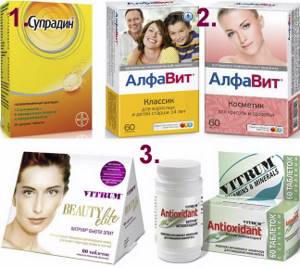
- Supradin (A, E, C, B6, 9, 12, coenzyme Q10) - you need to drink a course for a month in spring and autumn.
- Alphabet (A, E, C, D, coenzyme Q10) - the course of vitamin therapy is 2 weeks, drink twice a year, Classic and Cosmetic options are suitable.
- Vitrum Beauty (A, C, E, D, B, as well as several microelements) - recommended for vegetarians under 30 years old, more mature ones can take Antioxidant or Beauty Elite.
However, there is also an exclusively vegan vitamin complex for women - Organics Women's Once Daily from Garden of Life.
The diet of vegetarian women contains a lot of fruits and vegetables - natural sources of vitamins, so there is not always a need to drink pharmaceutical ones. However, when planning a pregnancy, throughout the entire 9 months of bearing a baby and during lactation, you cannot do without them. But they should be used exclusively as prescribed by the supervising doctor.
If we're talking specifically about vegan prenatal vitamin pills, it's Organics Prenatal Multi from Garden of Life.
For children
As to whether it is possible to introduce children to a vegetarian lifestyle, opinions differ radically. For example, the US Academy of Nutrition and Dietetics in 2021 published the results of its research, according to which a well-planned diet without meat and fish is quite suitable for all stages of a person’s life, including infancy, childhood and adolescence. But this is only provided that the child’s diet contains all the necessary nutrients. At the slightest deficiency, you will need to take pharmaceutical medications, because each vitamin plays an important role in the formation of a young body:
- D - for bone growth, muscle mass, strengthening teeth and nails;
- A - for growth, good vision, healthy skin (with its deficiency in adolescents, pustules, eczematous-like lesions, allergic rashes, peeling, cracks, etc. begin to appear);
- B12 - for normal metabolism, maintaining efficient brain function, uninterrupted blood circulation, and the development of the nervous system.
At the slightest sign of deficiency of one or more vitamins, parents should create either a more enriched menu for vegetarian children or give them complexes. The best on the modern pharmacy market are:
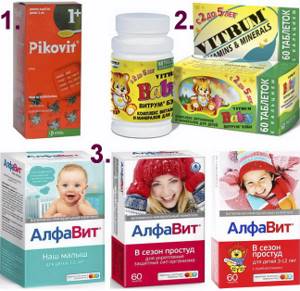
- Pikovit (Pikovit) - from a year and older.
- Vitrum baby (Vitrum Baby) - from 2 to 5 years.
- Alphabet for different age groups: Our baby, Kindergarten, Schoolchild, Teenager.
These complexes contain all the necessary vitamins for a child’s growing body and are an excellent prevention of vitamin deficiency.
Vitamin D
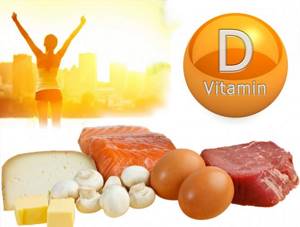
Vitamin D is necessary for the normal functioning of the most important systems and organs. The main function of this substance is to ensure the absorption of calcium and magnesium, necessary for the formation of bones and teeth. Vitamin D also improves the absorption of calcium in the kidneys and intestines, normalizes the content of phosphorus and calcium in the blood.
Other functions of vitamin D:
Stimulates the flow of calcium to bones and teeth, helping to increase their strength.
Takes part in cell growth processes
Increases the body's defense against the development of malignant neoplasms, inhibits the growth of cancer cells in the breast, skin, and colon.
Increases the effectiveness of treatment of oncological diseases of the breast, ovaries, brain, prostate gland.
Increases the protective functions of the skin, prevents various skin diseases, the development of psoriasis
A sufficient amount of vitamin D in the body affects the area of the brain responsible for the synthesis of monocytes - immune cells, thereby strengthening the immune system.
The vitamin is also necessary for the normal production of certain hormones. In particular, it regulates the production of insulin by the pancreas, thereby affecting blood sugar levels.
Vitamin D is also important for the functioning of the nervous system. It maintains a normal level of calcium in the blood, which in turn ensures the correct transmission of nerve impulses and contraction of muscle fibers. Data from some studies show: due to the fact that calciferol stimulates the absorption of calcium and magnesium, it helps restore the protective membranes surrounding the nerve. That is why vitamin D is included in the complex treatment of multiple sclerosis.
A lack of vitamin D can lead to serious consequences for the body. In particular, the risk of developing cardiovascular diseases and cancer increases. There are five main signs that may not indicate a deficiency of this vitamin:
- Frequent infectious diseases
- Constant fatigue
- Depressed mood
- Muscle pain
- Weak bones
Recipes
To prevent vitamin deficiency, vegetarians can prepare various dishes daily from foods high in vitamins. We offer some recipes as a basis.
Vitamin vegetarian salad (replenishes the lack of retinol).
Ingredients:
- 150 grams of white cabbage;
- 1 carrot;
- 1 cucumber;
- 1 celery root;
- 30 grams of pumpkin seeds;
- 30 ml olive oil;
- 15 ml lemon juice;
- 10 ml soy sauce;
- 2 cloves of garlic.
Preparation:
- Shred the cabbage.
- Grate the carrots and celery root on a coarse grater.
- Cut the cucumber into thin strips.
- Mix vegetables.
- Grind pumpkin seeds and garlic cloves.
- Mix butter, juice and sauce.
- Mix the liquid with the seeds and garlic.
- Season the vegetables with the resulting sauce.
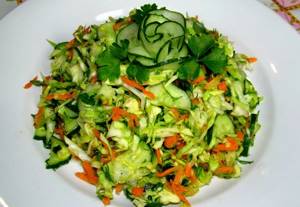
Wakame - seaweed soup (replenishes the lack of calciferol).
Ingredients:
- 10 g dried wakame;
- 50 grams of rice noodles;
- 150 grams of champignons;
- 70 g mung bean sprouts;
- 50 ml sunflower oil;
- 5 grams of black ground pepper;
- 5 grams of ground chili pepper;
- 5 g paprika.
For the broth:
- 3 liters of water;
- 2 carrots;
- 2 onions;
- 3 garlic cloves;
- 120 g celery;
- 2 bay leaves;
- 10 pieces. sweet pea;
- 20 pcs. black peppercorns.
Preparation:
- Rinse the vegetables for preparing the broth (carrots, onions, celery) under cold water, peel and chop coarsely.
- Add them to boiling water and cook for half an hour over low heat.
- Boil rice noodles according to package instructions.
- Mix the finished noodles with 30 ml of sunflower oil.
- Cut the champignons into slices.
- Peel the garlic cloves.
- Add garlic, bay leaf, peppercorns, and remaining sunflower oil to the boiling broth. Cook for another 10 minutes.
- Remove vegetables and spices from the broth. Place champignons and wakame in it and cook for 10 minutes. Add mung bean sprouts, ground pepper, paprika, and salt. Cook for another 5 minutes.
- Add rice noodles before serving.
Vegetables stewed with eggs - a recipe for lacto-ovo vegetarians (to prevent any hypovitaminosis).
Ingredients:
- 200 ml water;
- 5 tomatoes;
- 1 zucchini;
- 1 eggplant;
- 4 eggs;
- 15 ml tomato paste;
- green onions;
- 2 cloves of garlic;
- 4 sprigs of basil;
- 50 ml vegetable oil;
- 30 ml balsamic vinegar;
- 5 grams of granulated sugar;
- Provençal herbs (to taste);
- ground black pepper (to taste).
Preparation:
- Cut the zucchini into rings.
- Tomatoes and eggplant - into pieces.
- Crush the garlic.
- Cut the basil into strips.
- Chop the onion.
- Heat oil in a deep frying pan, add zucchini and eggplant. Fry until half cooked.
- Add onion, garlic, pasta, tomatoes, basil, vinegar, water.
- Salt, season with pepper, sugar, herbs.
- Bring to a boil, cover and simmer for 7 minutes over low heat.
- Make 4 holes in the vegetables and pour 1 egg into each.
- Cover with a lid and cook for another 7 minutes over low heat.
- Garnish with basil.
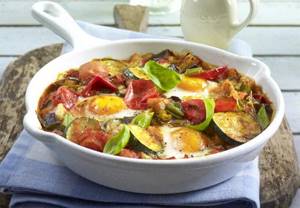
Sources of Iron for Vegetarians and Vegans
The lack of this microelement causes iron deficiency anemia and also contributes to the deterioration of the general condition of the body.
In the diet, iron occurs in two forms: heme, found in animal products, and non-heme, found in plant products. Since iron from meat is more easily absorbed than from plants, vegetarians and vegans need more of it to prevent or correct deficiency.
Sources of iron for a vegetarian are quinoa, buckwheat, beans, peas and other legumes, Cruciferous vegetables (broccoli, cauliflower), pumpkin seeds, and dark chocolate. Eating foods rich in vitamin C will help increase iron absorption.
Prevention of vitamin deficiency
Vegetarians are well aware that they are at risk for vitamin deficiency. And those for whom this is not an empty phrase try to prevent it in a timely manner, so as not to waste money and time on treatment later. What exactly does it consist of:
- Once a year, undergo a medical examination for the presence of diseases. Treat them when detected.
- Buy vegetables and fruits from domestic farmers. It’s a good idea to check them first for the presence of harmful substances. Transport in a wooden container. Correctly process: throw into already salted boiling water. These measures will allow you to preserve maximum vitamins in plant foods.
- In spring and autumn, take preventive vitamin complexes.
It is also necessary to keep in mind the features of preventing vitamin B12 deficiency:
- since alcohol and nicotine increase the body’s need for it, smoking and alcohol should be abandoned;
- carry out deworming of the body, since parasites often provoke cyanocobalamin deficiency;
- in the postoperative period, undergo regular tests (its absorption is impaired during surgical interventions);
- get tested for gastrointestinal diseases and treat them.
The problem of vitamins in the diet of vegetarians interests many. There are different points of view regarding its solution. You need to understand that this primarily concerns vegans and is not so acute for lacto-ovo vegetarians. By leading a healthy lifestyle, following a balanced and varied (even plant-based) diet, and timely prevention of vitamin deficiency can be avoided. And at the same time, it is hardly worth giving up ready-made vitamin complexes - there will be no harm from them, and they are guaranteed to reduce the risk of disease.
How to compensate for calcium deficiency
Animal products, primarily dairy, are rich in calcium. Eating a vegan diet can potentially leave you deficient in this essential nutrient. Calcium is needed for more than just strong bones or teeth. This mineral plays an important role in the function of the heart muscle.
To prevent calcium deficiency, regularly include a variety of seeds (such as chia), lentils, beans, soybeans, almonds, sesame seeds, and kale in your diet. Add the seeds to salads, eat hummus with sesame paste (tahini) more often, make sesame and other plant-based milks and add them to muesli.
